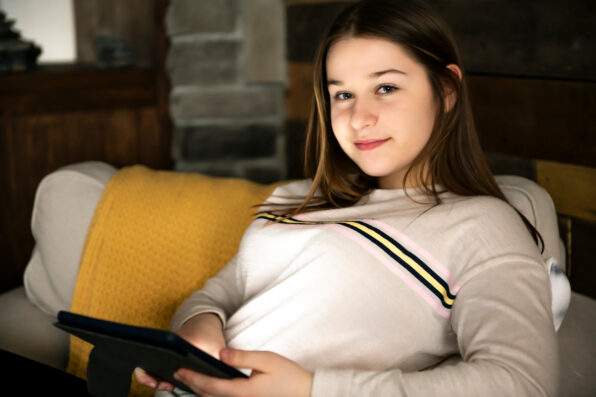This Doctor Is Sharing Insight Into Why Parenting Young Teens Can Be So Difficult

The twists and turns of navigating young adulthood are not to be downplayed. Young teenagers experience monumental shifts at this stage in their lives.
Everything is changing–their bodies, their way of thinking, the way they’re now viewed by society–and it can be super stressful to deal with. Each of these factors can play a role in why your teen seems to be growing moodier by the minute.
Dr. Lucie Hemmen (@dr.luciehemmen) is providing some insight on TikTok to parents of young teens. She explains why this age group is so hard to handle and even touches on how parents should respond to moodiness.
In the video, Dr. Hemmen shared a conversation she had with a therapist who’s new to working with teenagers.
The therapist was talking to Dr. Hemmen about some concerns she had about a teen who didn’t seem very self-aware.
“She was concerned because the teenager wasn’t showing much insight and had a lot of trouble self-reflecting and was basically blaming everything going on in her life on her parents and everyone else,” Dr. Hemmen recalled.
Without the therapist even needing to disclose the teen’s age, Dr. Hemmen knew immediately how old the child was.
She believed the client was under the age of fourteen, and the therapist confirmed her hunch with surprise. How did Dr. Hemmen guess the client’s age so easily?
Well, when a teen displays a lack of insight and self-reflection, that is part of the developmental stage that teenagers go through. It is by no means a lack of intelligence or an attitude problem.

pololia – stock.adobe.com – illustrative purposes only, not the actual child
Of course, all teenagers are different, and some thirteen-year-olds may already be highly self-aware while others are not.
Here’s what it looks like when a teen is able to show an understanding of the self and their feelings. They will say things like, “Hey, mom, I know I just yelled at you, and it’s really because I feel bad about my skin breaking out, and I’m sorry.”
However, most of the time, younger teens don’t know how to connect the dots to why they’re behaving in a certain manner, so they can’t take accountability for their actions and continue to “act out.”
It’s difficult for many parents not to take it personally when their teenager snaps at them. But as a parent, keep in mind that the changes they’re going through are affecting their daily lives and, therefore, their behaviors and attitudes.
As they get older, their brain will keep developing, and eventually, they’ll reach a point where reflecting and apologizing are easier for them.
To help them get there, you can express how you would like them to communicate with you. Say things like, “This is really the point where I would want you to say, ‘hey mom, I’m sorry I messed up, and I’m going to try harder next time.'”
So hang in there! Your teen will come back around to you. Right now, they’re just going through a particularly rough patch.
@dr.luciehemmen Parenting younger teens is hard! Hang in there, it’s gets better as they mature. #parenting #parentingtweensandteens
If true crime defines your free time, this is for you: join Chip Chick’s True Crime Tribe
In 1997, This College Student Vanished Without A Trace After Moving To San Fransisco For The Summer
Stop Chasing Others’ Ideas Of “Success,” And Start Putting Your Own Feelings Of Fulfillment First
Sign up for Chip Chick’s newsletter and get stories like this delivered to your inbox.
More About:Parenting





